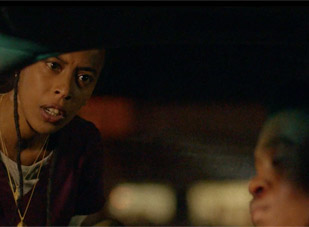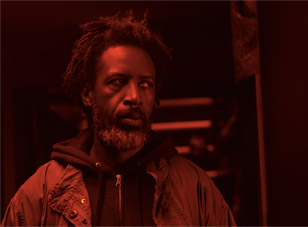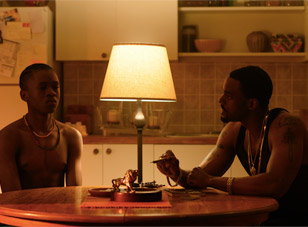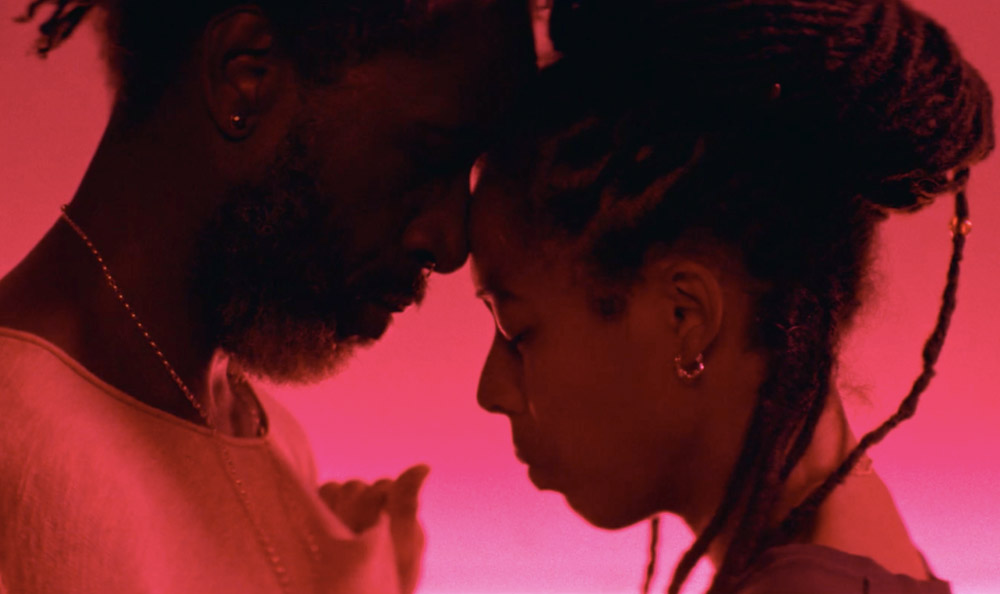It isn’t any old thriller set in the streets of Toronto that opens with a recent history of political strife in Jamaica, but then again “Akilla’s Escape” feels as if it’s on the bleeding edge at every turn. The second narrative feature from Charles Officer may require a bit of context in why Akilla (first played by Thamela Mpumlwana, then Saul Williams) is so troubled by the young man named Sheppard (also Mpumlwana) who he’s caught trying to rip him off as he’s making a delivery for his cannabis grow operation. The 40-year-old has already made the decision to leave the business when legalization brings federal and corporate interests in to reap the profits, as big as they’re bound to get, but he finds himself unable to walk away when he sees a bit of himself in the 15-year-old Sheppard, part of a local gang with ties south to the Area Six Generals, reminiscent of the real-life Shower Posse, a Jamaican gang armed by CIA to quash left-wing interests in the country and used their largesse to make money in the drug trade.
As Akilla looks to make his exit as elegantly as possible, despite pleas from his longtime partner-in-crime Benji (Colm Feore) and the disapproval of his boss Athena (Theresa Tova), he can’t help but get in his own way when he decides he’s taking Sheppard with him, a clever subversion of the “one last job” trope that Officer employs to not only amp up the tension when both other members of Sheppard’s gang and Akilla’s colleagues come looking for him, but to make the reasons for his departure more meaningful as he aims to break a cycle for both himself and the young man who’s suddenly in his care. Officer and co-writer Wendy “Motion” Brathwaite develop a multilayered narrative in which the full history of what Akilla is going up against can be felt, flashing back to when he first sat in a police station in New York in 1995 as cops interrogated him about his father’s death and tapping into his imagination to see what the future holds for Sheppard if he continues down the path he’s on, caught in the painful reality as Black men, the fact that they are often seen as criminals limits their opportunities to the point where crime starts to look like the only option to make a living.
With the effortlessly cool Williams in the lead, “Akilla’s Escape” unfolds sleekly even if getting out has more than its share of bumps over the course of a most dangerous night bathed in the most seductive of neon lights. On the eve of the film’s premiere at the Toronto Film Festival, Officer, Williams and Mpumlwana spoke about how they joined forces on the neo-noir, getting the right vibe on set for creativity and how Williams got Robert Del Naja from Massive Attack to help him with the film’s stirring score.

Charles Officer: This came about for me 10 years ago, and ideas for films are in your body before you actually start to put it down on paper, but after I made “Nurse Fighter Boy,” Mongrel Media and Siena Films put together a lab and they brought some writers together and I wrote the first draft in 2010. I’d been really paying attention to what’s going on in the city with gun violence and what was happening in Jamaica at the time with Christopher Coke and the Shower Posse [a notorious gang], and the political climate there, so it was inspiring a lot of these ideas that came to a question for myself of what does it cost black boys to escape a cycle of generational violence? That is what “Akilla” was born from, and I love the idea of [working in] genre – the tropes of a deal gone wrong, a man’s got to get something back and what does he encounter in that way and what does he have to sacrifice in the end? That’s where it all came from.
Saul Williams: Charles may have told me about this 10 years ago — when I first met Charles back in 1998 with my film “Slam” at TIFF, he spoke of us wanting to do something together at some point and I pretty much saw him every time I came to Toronto [since]. We’ve made it our business to hang out and to get a drink, and when this thing finally got to a point where it looked like it was something that was going to happen, Charles reached out and said, “Hey, that thing we’ve always spoken about. This is it.” So that was really beautiful to see that span of time coalesce into this moment and this film.
That’s fitting for a film that cuts across time and cultures — there’s so much history in this film, how much were you giving to the actors and what did you want to put on them versus creating their own thing?
Charles Officer: In this process, there’s a balance of learning, and I learn each time I do it is how much you want to control and how much you want [the actors] to go beyond what you thought and the freedom of that. I like to give actors space, but I’m also specific at the same time, so when I mention this idea of casting, I had these two individuals in my mind long before they knew that I was really going to approach them. You’re watching them do things and you’re writing scenes and with Saul, just knowing him for a period of time and coming to a place where I was like, “Okay, we’re ready to go in this direction,” it’s a give and take because they’re artists and I really respect what they bring to it. Making adjustments is something that you have to learn and some of the greats that I’ve read about, they do that, but it’s not something that just comes right away. It takes a bit of practice, so I was lucky to have amazing creative talent human beings who were able to invest. That’s really what it all comes down to.
Thamela Mpumlwana: The way that the set and the casting was set up, it made it very hard not to be intuitive about what you should do because just that environment allows for so much information and opportunity to interact and really gain your bearings for how you should go about playing your character. I was unaware of because Charles had this idea for this character and I was [under] consideration for it and when he brought the script to me, I was like, “Wow, this is big. This is a lot to think about.” But having access to Charles’ expert directing, just telling me what his intentions were for my characters and having access to Saul, just having his insight on what he was going to do with his character and looking to that as a guideline, just made it very easy to go about and understand putting on the performance.
Saul Williams: Yeah, the first insight into the character came from this beautiful script. Really, everything was there. At the end of my first reading, I had a pretty moderate sense of where this character was coming from. There were certain elements that stood out for me at first – his modesty in relationship to his past. I didn’t see it as something he was necessarily hiding, but it was something that he didn’t really need to get into it unless he needed to get into it. [laughs] Then of course because we’re dealing with flashbacks and different elements through Thamela’s character, getting a glimpse of how he became the way he is, it answered some of the questions that we might normally ask as actors because I had a strong sense of what traumas he faced as a child and what shaped him. Not only that, but saw where he was able to move away from where his father was trying to shape him, and his relationship to his mother and the distinctions between those two. There is a place where he steps in and says, “No, I’m not that. I’m this.”
Thamela, did the dual roles inform each other?
Thamela Mpumlwana: Yeah, these characters have this similarity and this representation of that generational dilemma that occurs when African-Americans are in this kind of environment or these kind of circumstances, so to have that opportunity to see it from both perspectives does informs you on how these entities relate to each other.
Saul Williams: A lot of that is really just in the script, so [Charles] and Motion really gave us the keys in the screenplay and then from there, it’s musicality, it’s accent, and one of the things that’s beautiful about this film, not only in the writing, but the way that it’s been done, with Charles here, who has a strong relationship with Jamaica, and Thamela, who not only has a relationship to Canada, but to South Africa, and me [with] my family background not only [from] the States, but to Haiti, we represent the diaspora. And there is a diasporic sensibility in the film as well that we were able to call upon in our portrayals.

Charles Officer: That was also part of the whole process. There were early drafts where I was also playing with structure and it went almost like an act and a half and you’re with this boy and suddenly, slam you’re with this man because there was this historical context that I was trying to embed, but also just not be a historical thing and let it ride off an emotional experience. When Motion came onboard, she’s part of this diaspora and she’s not Jamaican, but she has this point of view that was so valuable in our discussions [about] young Akilla and his family, even the backstory of how [his parents] Clinton and Thetis got together and how did this Haitian woman end up in Jamaica. We talked about all these connections, and then how did [the family] get to America and what does that mean when they leave America and come to Canada. This is a story that we are aware of how we’ve had to move around and where do we all come from? There’s an origin back to Africa.
It was important to reflect that and Motion and I tried to take that care, but it was a lot of math, basically essentially stripping it back to our characters. I’ve always been interested in interconnecting structure and one thing I read very early from [Alejandro Inarritu] who made “21 Grams” and “Amores Perros,” was that he said he wrote out everything and then did a process of elimination. And it’s a long process, and there’s different ways about it, but having another brain with you is really, really helpful, [especially] someone like Motion.
I wanted to circle back to what Thamela said earlier about how you really set the mood on set, which you suspect from the evocative lighting and just the energy in the scenes. Was there something to setting the right environment for the most creative work?
Thamela Mpumlwana: It was great because everybody’s position has an impact on the way that you do things, so when you have such an appropriate set up or assortment of different individuals, from the person playing my mom or my dad, to the person playing the older me, and all of them being so invested, it just makes you feel so focused and so driven to execute what’s at hand to the best of your ability. Plus, you have the set design where you have these lights here and you might have a smoke bomb going off here, so you’re so immersed and it’s such a great and inspiring feeling.
Charles Officer: Yeah, we were very blessed that we were able to assemble amazing people. There’s an energy thing from Maya Bankovic, our cinematographer, and our production designer Diane Abbatangelo, and it’s such hard work already, you become like a family [where] you have your moments, but at the end of the day, everyone was there to contribute to something and at the end of it, I think we all have something that we feel pretty good about. We shot a lot of nights and it was exhausting…
Saul Williams: Those night shoots were amazing. I loved them. You did two weeks of night shoots, and that contribute dto the vibe on set too. One of the things I was happy about from from the moment Charles cast me in this film, I started making playlists just for myself and it was a huge excuse to play Lee Scratch Perry all day. It was so crucial on and off set just to vibe musically. I was just like, “Yes, Jamaica.” [laughs]
Charles Officer: Getting his jerk chicken. [laughs]
Saul Williams: Yeah, I was like, “Oh, I need to eat Jamaican food to prepare. [laughs] It was a dream.

Saul Williams: Music is magic already. Just like filmmaking. But there was an intuitive connection that brought the music to this film in the way that it did, so on one hand, Charles approaches me to act in this film and says, “I want you to be involved in the music” and I informed Charles, “I’m working on music right now with Robert Del Naja from Massive Attack. It’s music that had no home, we’re just vibing off of each other and exchanging files and playing around, and after reading the script, I think the direction we’re going is in connection to what’s happening in this film, so let me share some of these ideas with you. And let me share the script with Robert. Let’s see if we can bring this together.” And what happened was amazing, [because] Massive Attack was on tour and passed through Toronto…
Charles Officer: We had just wrapped [filming].
Saul Williams: Yeah, they were approaching a cut and [there was] a need for music, so we were able to connect everybody and apply those connections and those ideas and the experience of living with that character to the film itself, so it was seamless. It all happened magically.
Charles Officer: It did. You have these hopes and dreams with films and the music is a very important part of the language that I like to speak in cinema. From the get go, one of the reasons I had always wanted to work with Saul was to maximize him to his fullest artistry, so I always wanted his involvement in the music, but then this whole synergy of what he was working on, and Massive Attack having this incredible influence on myself as a designer when I was in school and how I see things, and [connecting to] my roots back to England and my father, there were all of these things when this music appeared. Robert and Saul were so generous in terms of really surrendering to this piece of work and allowing us to explore it. Those sort of situations just don’t happen.
And I remember when Saul and I were shooting, at the spot where he was staying, he had a whole set-up to record music while he was working. I really respected that because he just wanted to focus on the role, but he has music inside of him no matter what he does. [laughs] So I knew it was going to be an amazing process no matter what, but we were grateful that it actually happened because once you get in that zone, I can’t imagine any other sound for this film. It’s impossible to imagine anything else. It was just amazing.
“Akilla’s Escape” will screen at the Toronto Film Festival on September 13th at the TIFF Bell Lightbox at 9:15 pm and virtually on September 15th at 6 pm.




